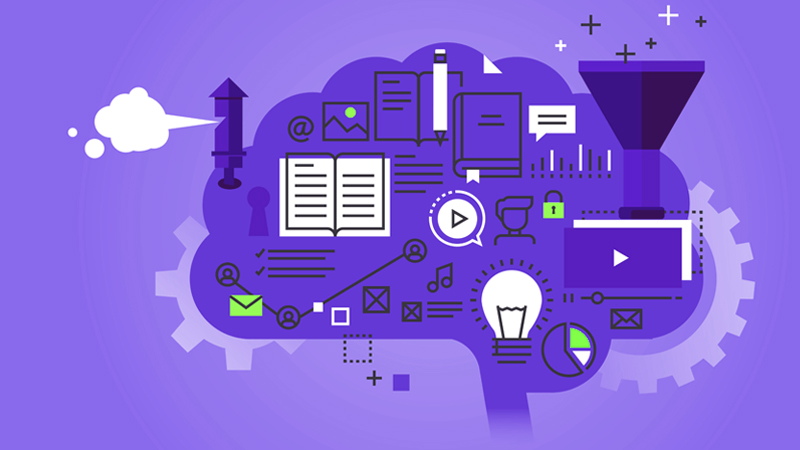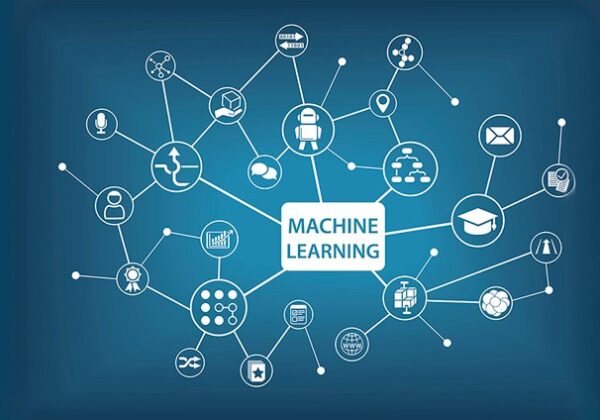Harnessing the vast potential of artificial intelligence to excel in business is no longer a distant dream. Many companies have discovered this, and as AI affects every sector of the technology industry, the need for machine learning developers has accelerated rapidly across all major companies. Let’s explore how machine learning can improve your business’ marketing.
Table of Contents
What Is Machine Learning?
Machine learning is a subset of artificial intelligence with pattern recognition at its core. It enables computers to analyze and interpret data and provide accurate predictions without any explicit programming.
The more data points used to train the algorithm, the better, as this allows for unlocking deeper insights and discovering increasingly subtle patterns.
A QuanticMind survey found that almost 100% of industry experts believe the future of digital marketing will be shaped by machine learning technologies and AI-based marketing automation.
13 Ways Machine Learning Can Enhance Marketing

1. Improve customer experience
Research shows that 57% of key executives believe this is the most beneficial area of machine learning.
Machine learning can improve customers’ online shopping experience in many ways, such as:
Guide the buying process and make personalized product recommendations to help customers find what they want;
Make sure your online store is never out of stock, or offer alternatives if stock is low; and
Provide customers with 24-hour support services
The growing popularity of drop shipping over the past decade has paved the way for many e-commerce companies and individual entrepreneurs to use machine learning to improve customer experience.
Take, for example, Kate Somerville, who combined the Magento e-commerce platform with nChannel to great effect. They use machine learning to create a more personalized shopping experience by responding to real-time data. This increases traffic, conversions, and of course, revenue.
2. Optimize Content
Content optimization is one of the most important aspects of SEO and helps increase visibility in organic search. Content that gets a lot of clicks helps get a better position in search engines and brings more traffic to your website.
Machine learning helps reveal what content performs best, whether it’s email subject lines, article titles, or images. For example, it might find that images of individuals perform better than images of groups and prioritize those results.
Insights drawn from a wealth of customer data about interests, past purchases, and online behavior can help marketers create the type of content that will most appeal to readers, from the emails they write to the products they offer.
In the past, marketers would launch ad campaigns without really understanding their audience and waste money on ads or promotions that didn’t resonate with them, according to experts at the UK-based essay writing service.
Machine learning can help eliminate this waste. It takes the guesswork out of allowing marketers to reach the right audience with the type of content that offers the best opportunities for engagement.
3. Create New Revenue Streams
Modern digital marketing is all about data. Due to the sheer amount of data available, it is increasingly common for marketing to be a top priority for many companies, as it is directly linked to increasing revenue.
Unlike any other company, retail giant Amazon harnesses the power of machine learning, generating 35% of its annual revenue from personalized product recommendations.
Their cloud computing service, Amazon Web Services (AWS), offers other companies the opportunity to benefit from artificial intelligence by using data insights to tailor services to customers’ needs. This, in turn, will allow Amazon to gain additional revenue streams in innovative new market segments.
Before the advent of machine learning, many marketers struggled for years to fulfill this so-called marketing prophecy. With data insights, decision makers have more insight and ability to predict what customers want before they even realize what they want.
4. Develop More Products and Services
Machine learning algorithms can help tailor new products and services more accurately to consumers’ needs. For example, potential customers can be surveyed globally and the data analyzed to deliver products.
This can help businesses identify new opportunities and new products to meet the needs of a new customer base.
The same solution can help companies deliver different products or versions of the same product to different markets. For example, surveys may show that drivers in the US prefer the four-wheel drive, while in Europe, hybrid vehicles are in high demand.
Armed with this type of information, automakers will be able to design suitable vehicles for the US and European markets.
5. Improve Personalization
People expect brands to care about them. Therefore, 52% of customers are likely to switch brands if they feel that a company is not doing enough to personalize its message.
Amazon’s success with the aforementioned e-commerce personalization is built on machine learning. They collect vast amounts of data about customers’ online behavior, interests, and past purchases to customize the online shopping experience.
From emails to product quotes, everything is personalized, and every touchpoint in the buying process.
It may seem ironic, but machine learning helps create a more human experience.
E-commerce personalization makes customers feel more important, and experiences are carefully designed to meet their needs and interests.
This helps foster loyalty. Customers will trust a brand that makes them feel heard. Research shows that 44% of customers will buy again after a personalized shopping experience.
6. Uncover Trends
Machine learning mines unstructured data and allows insight into what customers are talking about in the public sphere. It can decipher social chatter to inspire new product or content ideas that relate directly to customer preferences.
An example of this is when Ben & Jerry’s discovered that people were talking about ice cream for breakfast in the public domain and decided to launch a range of breakfast-flavored ice cream.
7. Reduce ‘Marketing Waste’
When it comes to marketing, having a system that can quickly identify trends and actions in real-time and then react accordingly without any human input is very useful. This ability to “learn” on the move is what makes machine learning so important in marketing today and for years to come.
In the past, many marketers just relied on guesswork to launch ad campaigns. Without really understanding the audience, a lot of money is wasted on advertising or promotions that don’t resonate with their target customers.
Machine learning eliminates this marketing waste.
In the digital age, taking a rambling approach to marketing is not only unnecessary, but it’s also sheer stupidity. Machine learning takes the guesswork out of the process, enabling marketers to reach their audiences with content and product offerings most likely to engage and ultimately convert.

8. Improve Lead Generation and Scoring
Leads are the lifeblood of businesses, and machine learning can help them generate higher-quality leads. Bots using artificial intelligence can learn from conversations between sales reps and consumers on a website.
This information enables them to answer questions, learn more about what makes a good lead, and generate leads from large-scale visits
Knowing how likely a prospect is to make a purchase can help marketers handle many leads. Machine learning uses data to score leads, which can increase efficiency and save time.
It becomes easier to focus your energy on converting those leads. When looking at the profiles of the customers who buy the most, marketers are able to identify common traits they can remember when marketing.
9. Automate Marketing
Automation takes marketing to the next level. Machine learning processes data learn from past results, and provides actionable insights.
It helps with various aspects of marketing such as customer segmentation, making recommendations, personalizing content, and customer service.
This helps simplify decision-making for marketers and keep improving while learning. Brands that manage user experience by using marketing automation can achieve higher rates of qualified leads and experience increased revenue.
Machine learning-powered email marketing helps marketers segment customers and highly personalize their email marketing campaigns. They can write personalized email subject lines and messages to drive customer engagement.
They can use previous responses to determine the best time and way to send the message. Building separation testing into their email marketing can help keep improving ROI.
10. Optimize Prices
Dynamic pricing has been around for a while and is often used in the hospitality and travel industries. These industries offer flexible pricing based on market conditions and customer needs.
More and more retail businesses are also adopting flexible pricing because they have the data they need and analyze them through machine learning.
Determine the pricing elasticity of each product by taking into account factors such as sales cycle, customer segmentation, product positioning, and more. Machine learning algorithms can also help determine which customers are likely to respond to discounts.
11. Predict Customer Churn
Being able to predict churn enables businesses to reach them before they leave. It is possible to train a machine learning model to take customers with and without churn, to spot patterns and identify those customers who are less likely to churn.
Urban Airship is a digitally growing company that uses machine learning algorithms to analyze mobile customer behavior to help app publishers identify loyal users and predict those most likely to churn.
Marketers can then take action to deepen customer engagement or invest more in retaining certain customer segments.
12. Target the Right Influencers
Today, more and more brands are using influencers. They know not to use them blindly and want them to be consistent with their brand values. This can help them reach and reach a wider audience and boost brand credibility.
Machine learning tools can help scour social media posts for various metrics and recommend influencers who can best connect with their audience.
Machine learning helps solve one of the biggest problems when using influencers, which is that influencers have fake followers and those who exaggerate their performance.
Tools based on natural language processing (NLP) machine learning can understand the video content posted by influencers and help brands choose the right brand ambassador. It also helps them understand how influencers are delivering their brand message.
13. Manage Social Media
Machine learning helps marketers leverage the power of data to optimize their social media presence. For example, it can help them identify comments or complaints that require an immediate response to manage a brand’s reputation.
A social listening tool powered by machine learning can track hashtags, keywords and brand mentions across all social media platforms.
The insights gained from analyzing this data can help brands create the right type of content for each platform, engaging audiences on a deep level.
Also Read: Machine Learning in Marketing
Final Words
Machine learning in marketing is becoming a game changer as the new wave of new technologies leveraging machine learning puts the power in the hands of marketers. This will usher in a new era of better understanding of consumers and improved customer experience.
Over the next few years, it will likely become more apparent how machine learning can transform the way brands interact with customers and provide a more authentic experience in attracting, selling, and serving customers.
This can have a significant impact on the business’s bottom line.




